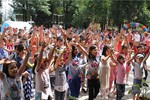Home > News of the Region > News
News

Statelessness as InheritanceEveryone wants a good education, a family and a career, to buy their own house, own their own property and travel abroad. But there are people living among us who cannot achieve even a small fraction of these goals due to their uncertain position in society. These are stateless people, who no government recognizes as its citizens. As a rule, these people find themselves relegated to the sidelines of society, among the poorest and most socially vulnerable. On a daily basis they face serious obstacles in accessing public services, and exercising their fundamental rights and freedoms. And statelessness can be handed down through generations, from parents to children, making it even harder for affected people to escape the legal vacuum. Children, as well as adults, need identity documents in order to gain access to the full range of rights and protection from the state. As part of the United Nations global campaign to eradicate statelessness, #IBelong, the United Nations High Commissioner for Refugees (UNHCR) in Tajikistan has published the stories of people who managed to break the cycle of statelessness and find a meaningful place in society. All names in the stories have been changed to protect privacy. Muslima and Firdavs’ Story This story, overflowing with tragedy and pain, reflects the fate of 7-year-old Muslima and her 8-year-old brother Firdavs from the town of Tursunzoda. Both children are looked after by their aunt due to family circumstances. These children first came under the care of their grandmother after their father, Anvar, was convicted and imprisoned. Their mother left home and disappeared from their lives afterwards. Gulnora’s son Anvar, and her daughter-in-law, Halima, lived in a civil marriage not registered with the civil registry office. In 2011, when her husband was serving his sentence, Halima left the two children under her mother-in-law’s care and never returned. Since then, nothing was heard from Halima and her whereabouts remain unknown. She has never been in touch or helped support the children’s upbringing. Gulnora was thus left alone raising her two grandchildren, who had no birth certificates. In order to take them to meet with their father, or enroll the children in school, Gulnora appealed to lawyers from Rights and Prosperity (a NGO) for legal assistance in obtaining birth certificates for her grandchildren. The only documents the children had were medical certificates obtained from the Tursunzoda town’s maternity hospital. However, in order to obtain a birth certificate, documents were needed from the biological mother, Halima, whose location was unknown. Due to the fact that the marriage between the children’s parents has not been registered, the father has no legal rights regarding the children. It was thus necessary to establish paternity in the court in order to obtain birth certificates for children. With financial support from UNHCR, Rights and Prosperity hired a lawyer to help the children obtain birth certificates. The lawyer went to the correctional facility several times to visit their imprisoned father to obtain a power of attorney letter allowing him to pursue the paternity case on his behalf. The court hearing, held in May 2016, of established Anvar’s paternity rights over the children. But unfortunately, the children’s grandmother did not live to see her grandchildren receive their birth certificates. She died shortly before the court’s decision entered into force. Despite this, the children were assisted in obtaining birth certificates. Muslima and Firdavs currently live with their aunt, the children attend school, and have access to medical care and other social services. The story shows that the parents’ irresponsibility towards children, especially concerning timely registration of birth, leads to numerous difficulties and sufferings, restriction of their rights and opportunities. Olesya’s Story Up until her 38th birthday Olesya only had one document confirming her identity - a birth certificate issued during the Soviet period. When questions of life and survival come to pass does anyone thinks about documents? A difficult childhood during the civil war, and her parents’ divorce did not pass without leaving a trace on her fate. Olesya was subsequently married, had five children, and lived a hard life in the countryside. None of Olesya’s five children was registered at birth because Olesya herself did not have a passport. The marriage between Olesya and her husband was not officially registered for the same reason. When someone applies to a jamoat (local council) to obtain a birth certificate for their child, being unable to provide a passport, is always followed with a refusal to issue a certificate. “My middle son was never admitted to school because he didn’t have a birth certificate,” Olesya says. Today, the boy is already 13 years old. He has not yet known the joy of the ‘first bell’, or the ‘first lesson’ at school, and now he will spend little time sitting at the school desk with his peers. The question of documenting children became a critical issue when it was time to receive a certificate of school graduation for Olesya’s eldest son, Volodya - the family’s future breadwinner. Olesya has placed great hopes on him, because she was tired of carrying the family all her life. This spring, a local teacher suggested that Olesya visit an NGO in Shaahrtuz called Chashma, which provides assistance to people facing issues with citizenship and documentation. Here Olesya met with Chashma staff who, in April 2018, helped her to confirm Tajik citizenship. After four months of collecting documents, they assisted her in acquiring registration and birth certificates for five children. Olesya is immensely happy that with the help of the UNHCR project on reducing statelessness, she and her children have been documented and no longer risk becoming stateless. Jamila’s Story Jamila, a happy mother of five children, married early in life and lived in an unregistered marriage. Perhaps Jamila would have lived her whole life without having any official documents until her children started having problems at school. “The school administration demanded that we provide birth certificates for the twins – Fotima and Zuhro - otherwise they threatened to expel them from school,” Jamila says. She understood that to begin with, she herself needed to have a passport, but after several trips to the administrative center and appeals to various instances in Shaahrtuz, Jamila became exasperated. Having no financial capacity to collect documents, not knowing the laws and administrative procedures for obtaining a passport and having only a birth certificate, Jamila was desperate. This was when neighbors told her about a statelessness reduction project where she could obtain legal assistance in acquiring citizenship and a passport. The family was in a difficult financial situation, as due to a leg injury and partial loss of working ability, Jamila’s husband also needed treatment and disability registration. Having assessed the family’s difficult financial situation, monitors from Chashma began providing not only legal, but also financial assistance to Jamila for navigating the citizenship confirmation procedure and obtaining a passport. “As soon as I received my passport, my husband and I registered our marriage and at once registered the birth of all five children,” recalls Jamila. The most important thing in this story is that the vicious circle of statelessness was broken. Both Jamila and her children became full-fledged members of society and can now enjoy all the rights guaranteed for citizens of Tajikistan. The 2030 Sustainable Development Goals (SDG) and the obligation “not to leave anyone behind” provided for in its framework addresses the problem of statelessness. SDG 16 states that by 2030, governments have to ensure that all people have legal identity cards, including birth certificates. In 2014, the Government of Tajikistan and UNHCR launched a national pilot project that identified 30,752 people with undetermined citizenship in three target regions of Tajikistan. Of these, 34% are children and 68% are women and girls. Through legal and, where necessary, material assistance, provided by UNHCR and its NGO partners, 25,778 people confirmed their citizenship in Tajikistan. As a result, these people can fully enjoy their rights and freedoms. Looking at the case studies presented, it is imperative that parents document themselves and register the birth of their children in a timely manner to ensure that the burden of statelessness is not passed on to their children. 27.11.2018 |

UNHCR supplies the Committee of Emergency Situations with Prefabricated Housing Units
15.02.2019

In Kyrgyzstan as much as 18,000 children are invisible
05.02.2019

Meeting of UNHCR for Central Asia with MFA of the Republic of Uzbekistan
29.01.2019

UNHCR AND DUSHANBE SERENA HOTEL LAUNCHED A JOINT APPRENTICESHIP PROGRAMME
28.01.2019

»» Statelessness as Inheritance
27.11.2018

IBelong Campaign to End Statelessness 4th Anniversary
13.11.2018

A Long Road to Citizenship
31.10.2018
A Long Road to Citizenship
NotATarget: Insight into the Reality of the Humanitarian Aid
05.09.2018
Almaty, 20 August 2018 - World Humanitarian Day is commemorated on 19 August each year.
World Refugee Day 2018 in Central Asia
29.06.2018

Regional Commitments to Prevent Statelessness in Action
12.06.2018
Childhood statelessness, often caused by the lack of birth registration and other legal safeguards



